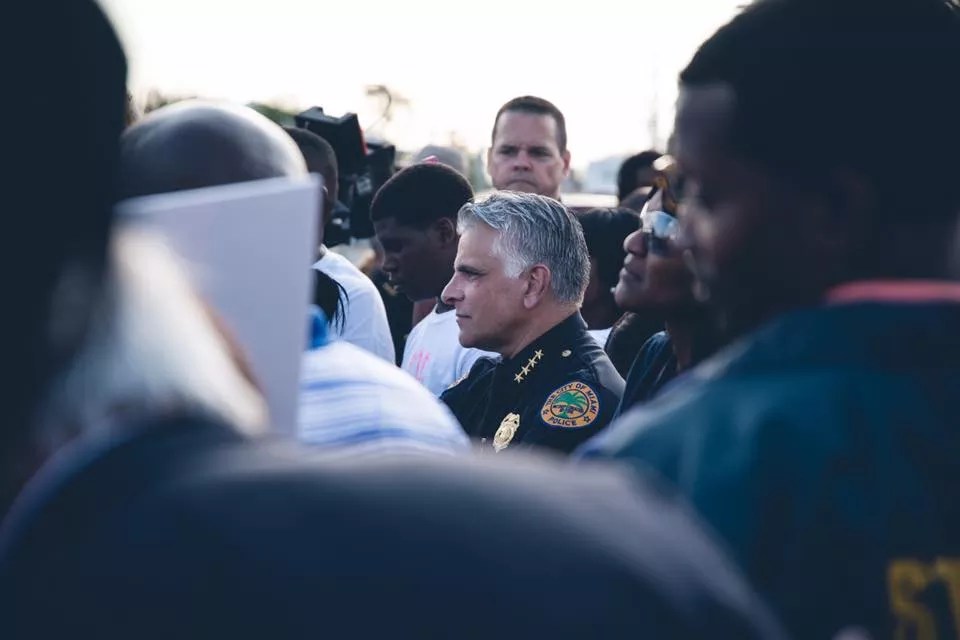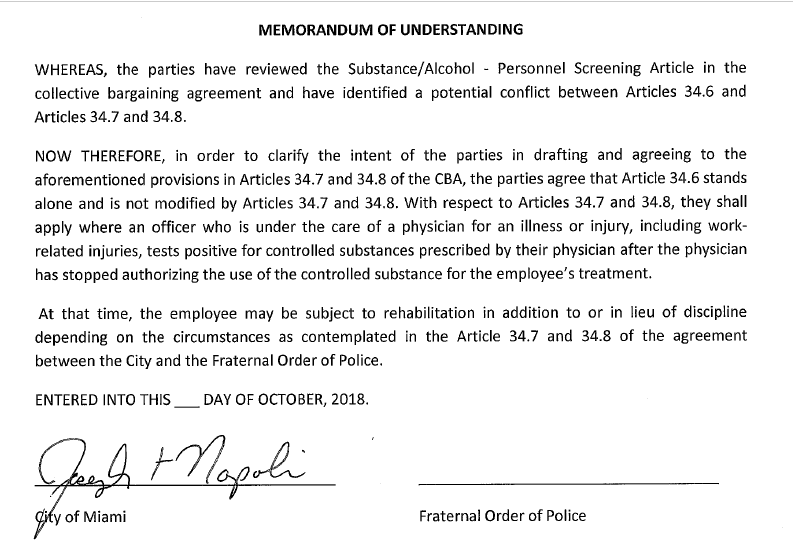
City of Miami Police

Audio By Carbonatix
Miami Police officers nearly just won the right to do drugs and get away with it. Last month, New Times obtained a copy of the police department’s new labor contract, and its language would let cops caught doing illegal drugs keep their jobs as long as they entered rehab after failing a drug test. Many critics found the rule hypocritical because one of the police department’s main jobs is to arrest people doing drugs.
Now, after New Times publicized the contract’s details, the city and police union have walked back on that proposal.
In the latest version of the contract, the provision letting cops keep their jobs after getting caught doing drugs such as cocaine, MDMA, crystal meth, ketamine, and heroin is gone. The language now states officers can keep their jobs only if they test positive for legal drugs prescribed by their doctors for illness or injury. The rewritten provision is now designed to give officers with opiate drug addictions the chance to enter rehab before losing their jobs.
Miami Fraternal Order of Police President Edward Lugo sent a draft of the memo to FOP members last Tuesday. According to an email obtained by New Times, Lugo said a particularly large group of union cops was concerned about the contract’s original language, which gave officers a second chance after doing virtually any sort of drug. He wrote:
Our members were concerned that the language would support drug abuse amongst the rank and file. Our elected officials and the FOP want to ensure that this is not the message we send out in the collective bargaining agreement.
The MOU [memorandum of understanding] clarifies only the drug article. It gives extra protection to any member that is involved in an on duty injury and becomes dependent on drugs. (example: You’re involved in a crash or injured by a suspect and get addicted to prescription drugs.). The opioid epidemic has been called the worst drug crisis in American history. Death rates now rival those of AIDS during the 1990s, and with overdoses from opioids now killing more than 27,000 people a year. In the event you have an addiction related to an on duty injury, rehabilitation is an option. This option is being added to address addictions related to on duty injuries. If someone tests positive in a different circumstance, the current policy would stay enforced. I don’t know of anyone that would have an issue with this position. As law enforcement officers, we are held to a higher standard.
The new draft policy is consistent with public statements from Chief Jorge Colina, who told WTVJ after New Times‘ story was published that he would not allow officers to use drugs such as cocaine while he was chief and that he simply supported giving opiate addicts the option to enter treatment. At the time, Colina’s statement did not mesh with the text of the proposed labor contract, and under the old draft, Colina could have been sued for firing a cop caught doing recreational cocaine.
Here’s a copy of the updated language:

Fraternal Order of Police
For what it’s worth, there’s still a hint of hypocrisy even in this stance given that using prescription drugs not authorized by your doctor is still illegal, and it’s something for which citizens are still arrested. The opiate crisis has not, unfortunately, led local police departments to actually wind down the War on Drugs.
But the new policy is significantly more reasonable than the last contract, which would have let officers snort lines of cocaine off strippers and then keep their jobs if it was their first offense.
Of course, these new rules would protect only officers who failed drug tests – not cops caught driving around with duffel bags of MDMA pills in their trunks. If an MPD officer were videotaped snorting cocaine in a nightclub, he or she would likely still face punishment. We’d hope.